WW-I: Hill-70: Another great Canadian victory 101 years ago
Four soldiers buried today
In a terrible war, it was another tremendous victory for the Canadians, with six Victoria Crosses awarded, the highest Commonwealth medal for valour. As always tragically, the victory at Hill 70 came at a tremendous cost. The German bullets, shrapnel and gas resulted in over 2,000 killed and almost 8,000 more were wounded.
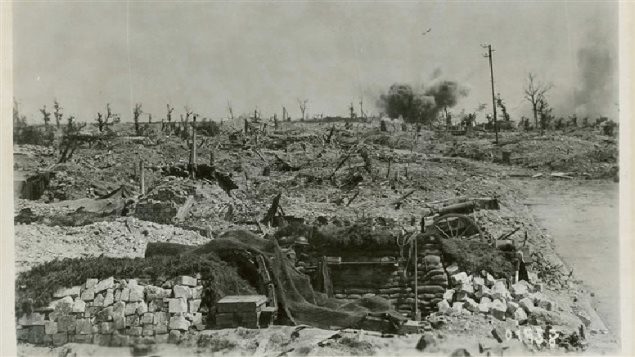
A shell bursts in the distance as a Canadian soldier inspects what appears to be an overrun German gun pit. The partially uncovered wheel and trail of what might be a 21-cm howitzer can be seen, with the wheel of what might be a limber on the far side of the pit. The site has been covered by the Germans with netting likely to conceal it from Allied spotter planes (Canadian War Museum 19920085-814)
At a solemn ceremony in this day, Aug 23, 2018 in northern France, four Canadian soldiers from the First World War were buried, 101 years after they fought and died at and around Hill 70 near Lens, France.
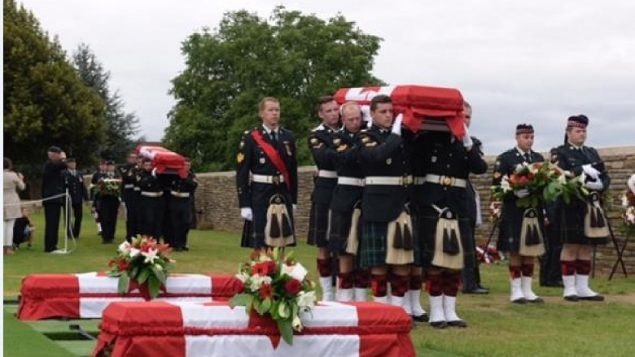
The ceremony today at Loos-en Gohelle, France, to bury the remains of four Canadian soldiers who fell during the Battle of Hill 70 almost 100 years ago. Their remains had been found in the past few years. Over 1,000 others who fell still have no known grave (Canadian Forces)
The remains were found between 2010 and 2016 during construction projects in the area and were buried at the war cemetery at Loos-en –Gohelle near where they had fallen.
The Canadian ministry of defence identified them last October using forensic anthropological analysis, historical research and DNA analysis.
They are listed as Private William Del Donegan, 20, Private Henry Priddle, 33, and Sergeant Archibald Wilson, 25. All three soldiers enlisted in Winnipeg, Manitoba. They died on August 16, 1917, in the Battle of Hill 70, as members of the 16th Battalion, Canadian Expeditionary Force (CEF), a unit perpetuated by The Canadian Scottish Regiment (Princess Mary’s) of Victoria, B.C.
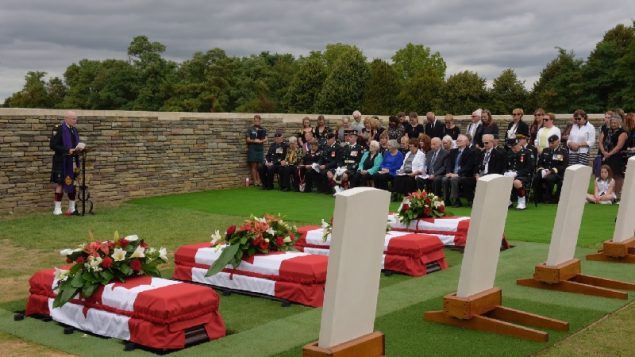
The four Canadian soldiers finally identified and laid to rest at the military cemetery at Loos-en-Gohelle,France, almost 100 years to the day they fell nearby at the Battle of Hill 70. (Canadian Forces)
The fourth soldier is listed as Private John (Jack) Henry Thomas, of the U.K., and Birch Ridge, New Brunswick. Private Thomas was a member of the 26th Canadian Infantry Battalion (New Brunswick), CEF, a unit perpetuated by The Royal New Brunswick Regiment of Fredericton, N.B. He died in the battle on August 19, 1917, at the age of 28.
Goverment of Canada- histories of the four men
- Private William Del Donegan
- Private Henry Edmonds Priddle
- Sergeant Archibald Wilson
- Private John (Jack) Henry Thomas
Hill 70; not a very auspicious name, yet 101 years this week ago it was the site of a tremendous battle and victory as an entirely Canadian force captured this high ground near Lens France.
By August 1917, the Germans had come to fear the Canadian Corps which they considered the most capable of the Allies.
On August 15 after careful planning, the all-volunteer Canadian Corps launched the attack against the heavily defended Hill 70, successfully overran German defences and held on against no less than 21 determined counter-attacks, inflicting terrible losses on the German army.
- RCI: Oct 2016: Book- Hill 70
- RCI: Apr 2017: Hill 70-interview Hill 70 chairman
- RCI:Oct 2016: identifying soldier remains- interview
It was another major Canadian victory, and the start of the fearless reputation of Canadian troops leading to later became known as Canada’s 100 days in which Canadians led and won every battle they were sent into up to the end of the war.
But for all the significance, Hill 70 was all but forgotten and there was nothing to indicate that tens of thousands of soldiers were wounded or lost their lives on both sides in this terrible battle.
A group of Canadians decided to change that. A non-profit, non-paid volunteer group led by retired Canadian Forces Colonel Mark Hutchings, began raising funds to create a memorial park and obelisk in time for the 100th anniversary last year.
The Hill 70 Memorial
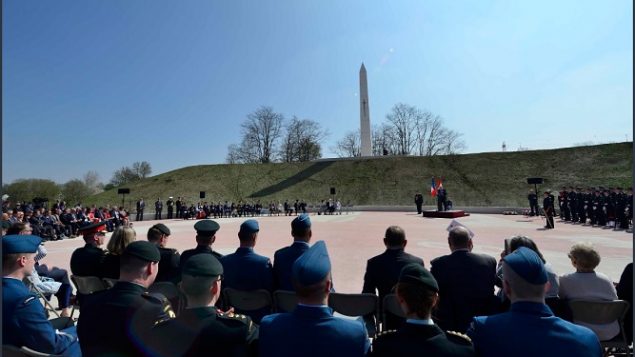
The newly dedicated Hill-70 Memorial stands on the last piece of land donated by France for WWI battle recognition (GG-Rt Hon. Julie Payette-twitter)
Although the obelisk and park was officially dedicated in 2017, more features to the multi-million dollar project are still being added.
Funded entirely through private donations, Canadian philanthropist Robert N Ho has recently added $1.5 million dollars for the creation of a Frederick Lee walkway to the memorial.
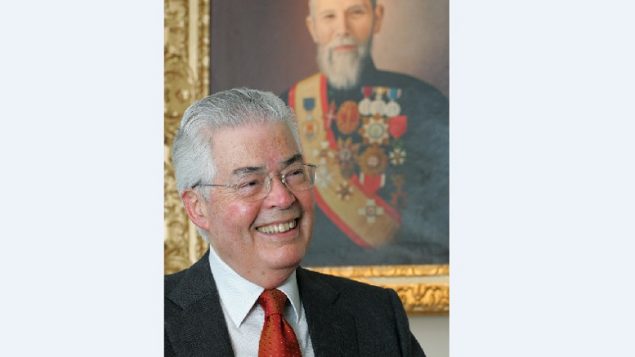
Canadian philanthropist Robert H.N. Ho (何鴻毅), O.B.C. has donate $1.5 million to the project. He is a descendent of Sir Robert Ho Tung Bosman (pictured in the background) and Lady Clara Ho Tung. (via Hill 70 Project)
Private Lee was one of about 300 Chinese-Canadian volunteers in the Canadian Corps and had already fought in the famous victory at Vimy Ridge. He was later killed in action at Hill 70 and like some 1,300 other Canadians who fought in that battle, has no known grave.
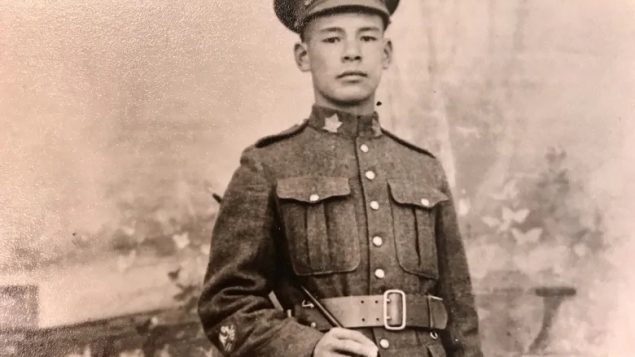
Pte Frederick Lee was one of about 300 Chinese-Canadians who volunteered to serve Canada even at at time when they faced considerable discrimination. (courtesy Norman Lee)
Hill 70 Chairman Col. Mark Hutchings commented that the donation was pivotal in enabling his team to proceed with this commemoration to Lee
“We are thrilled to be able to venerate the remarkable story of Frederick Lee whose service to this country made him a role model for all Canadians. However this key element would not have been possible without the generous support of a notable individual – Robert H.N. Ho – a man with a keen sense of history, who has experienced it first hand”.
Lee and the others volunteered at a time of significant discrimination in Canada, but Hutchings says, “These men wanted to serve Canada to prove that they were indeed loyal Canadians. Frederick Lee, and others like him, made the ultimate sacrifice for this country. This is why we chose to honour him at the Hill 70 Memorial. He is representative ofmany other first generation Canadians whose families came from other lands”.
As to why this major action and all-Canadian victory was forgotten for so long, Hutchings says one reason is that casualties were comparatively light in a war where battles resulted in sometimes in tens of thousands of deaths and so it didn’t really register with historians. It also came between two more famous battles, the largely Canadian action at Vimy which was the first success of note in was the Allies had not been winning, and that of Passchendaele, where indeed the casualties were astronomical in a battle that dragged an and on in the mud and trenches.
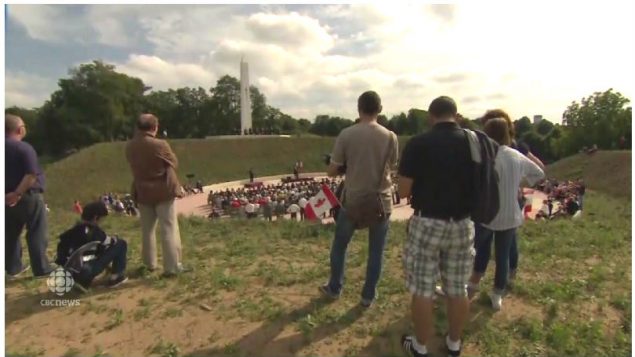






For reasons beyond our control, and for an undetermined period of time, our comment section is now closed. However, our social networks remain open to your contributions.